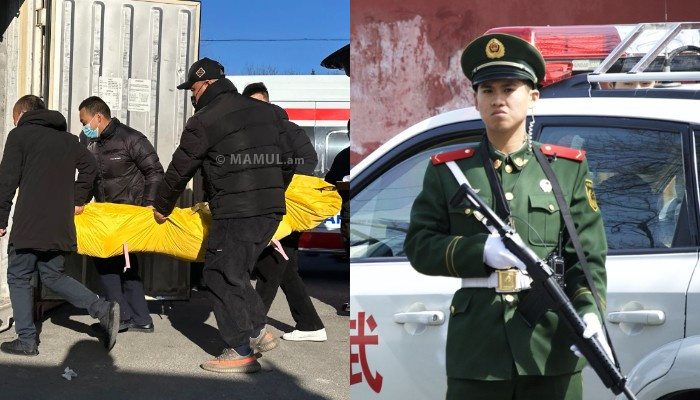Chinese network accused of stealing thousands of corpses to use bones for dental grafts
 24069 Friday, 09 August, 2024, 19:24 A Chinese criminal network reportedly stole over 4,000 corpses from crematoriums and medical facilities to extract their bones for dental grafts. Dozens of people have been accused by prosecutors in northern China in connection with the decade long conspiracy that found bodies intended for cremation instead sold to a state-affiliated biomaterials company, one of the biggest in the nation, as reported by South China Morning Post. A prominent criminal attorney shared information of the case on social media on 8th August, sparking public outrage. The authorities in Taiyuan, the capital of the northern province of Shanxi, are looking into claims that the bones have been utilized to create allogeneic bone transplants, which are usually produced from bones taken during surgery, according to Yi Shenghua, president of the law company Beijing Brave Lawyer. Sichuan Hengpu Technology Co. and Shanxi Osteorad Biomaterial Co.’s proprietors and opeartors are charged with obtaining approximately 4,000 cadavers through unethical ways, which enabled the former to earn up to $53 million in profits between 2015 and 2023. Established in 1999, Shanxi Osteorad was a division of the China Institute for Radiation Protection in Taiyuan, which is a part of the Beijing-based state-owned China National Nuclear Corp. It is one of the biggest suppliers of bone substitutes and grafts in the nation, with a market estimated to be valued at half a billion dollars by the end of the decade. The maker of medical devices, Sichuan Hengpu, is also owned by its largest shareholder. According to a leaked May indictment by the Taiyuan People’s Procuratorate in Shanxi province, the corpse trafficking covered at least seven provinces and nearly a dozen localities, where dead bodies were either transferred, dissected, stored, or turned into material devices for bone-grafting procedures. According to a representative for the Taiyuan municipal procuratorate, prosecutors are probing whether an unlawful group was “stealing and reselling corpses for profit.” A string of arrests by anti-corruption agents has put the state-run funeral business in the public eye. The evidence, tagged as “prosecution opinion,” was sent to Yi by a “insider” and was “authentic,” he told the Shanghai-based news portal, The Paper. According to his social media post, a business called Shanxi Aorui Biomaterials is accused of purchasing dead bodies and limbs from the provinces of Shandong, Guangxi and Sichuan without authorization and utilizing them to make bone transplants. He added that the company made 380 million yuan (US$53 million) during this time, primarily from the sale of the bones used in dental grafts. Yi’s paperwork reveal that the police confiscated over 18 tonnes of bones in addition to over 34,000 semi-completed and finished goods. The general manager of the company, a suspect with the surname Su, reportedly admitted to the authorities that he had stolen over 4,000 human remains from cemeteries in Yunnan, Chongqing, Guizhou and Sichuan. According to the report, the remains were roughly dissected by the personnel at crematoriums in Shuifu city, Guizhou’s Shiqian county, Chongqing’s Banan district, and Sichuan’s Daying county in order to send them to Su’s company for additional processing. At least 75 people are suspected in the case, including shareholders, doctors and funeral home administrators. Prosecutors informed the Shanghai news site The Paper that the extensive probe was still ongoing. Allegations were made against Shanxi Osteorad for manipulating donor contracts in order to provide allogeneic bone implant material for Chinese patients. Prosecutors reported that its employees mistreated cadavers as well. The National Medical Products Administration is in charge of the biomedical devices market in China. The Ministry of Civil Affairs is in charge of the funeral industry. For many years, in an effort to conserve land, Chinese authorities have promoted cremations, little funerals and graves at sea. Due to the COVID-19 pandemic, families were unable to obtain customary funeral ceremonies, which led to an increase in cremations. However, the indictment asserted that four funeral homes in the Chongqing municipality and the southwestern provinces of Yunnan, Guizhou, and Sichuan took money from relatives for cremation services before selling the bodies to two hospitals for storage and dissection. Some family members, according to the prosecution, paid for the cremation services but did not want to take the ashes home. Other times, cadavers that had not been claimed were chosen instead. |

Woman who suffered flesh-eating disease after insect bite receives a face transplant
185004.02.2026, 00:07
India rushes to contain deadly Nipah virus outbreak after five cases confirmed
622324.01.2026, 20:43
Thousands of NYC nurses strike for better staffing and pay (video)
960912.01.2026, 23:38
Nestle issues global recall of some baby formula products over toxin fears
1112207.01.2026, 20:43
Air pollution India's biggest health crisis since Covid, warn doctors
1344426.12.2025, 17:41
"What Is This Mushroom?"... Japanese Man Trusts AI, Ends Up in Emergency Room
1525627.11.2025, 22:53
Kenya's refugee camps suffer as US slashes aid (video)
1291611.08.2025, 23:36
US considering China travel warning after nearly 5,000 cases of deadly virus: report
1393603.08.2025, 18:12
